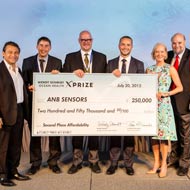Winners of $2m ocean health prize revealed

Ocean acidification is damaging the health of shellfish, fisheries, coral reefs and other ecosystems.
A team of UK scientists have won $250,000 in a global competition to develop accurate and affordable pH sensors to measure ocean chemistry.
The Wendy Schmidt Ocean XPRIZE is a $2 million award. It aims to tackle the growing problem of ocean acidification through the development of pH sensors.
Ocean acidification is already having a serious impact. Driven by rising CO2 emissions, it is damaging the health of shellfish, fisheries, coral reefs and other ecosystems.
Previously, the only available sensors were too expensive and imprecise to give sufficient knowledge of ocean chemistry.
First prize was awarded to US company Sunburst Sensors, who received $1.5 million for their sensor. Cambridge-based ANB Sensors came in second place for affordability, while Team Durafet, US, got second place for accuracy and also received $250,000.
A total of 24 teams from around the world battled it out for the top prize and after four months of testing, five teams were shortlisted to travel to Hawaii and carry out week-long trials of their sensors in May.
The work of the three teams brings us one step closer to tackling ocean acidification.



 The Veterinary Medicines Directorate (VMD) is inviting applications from veterinary students to attend a one-week extramural studies (EMS) placement in July 2026.
The Veterinary Medicines Directorate (VMD) is inviting applications from veterinary students to attend a one-week extramural studies (EMS) placement in July 2026.